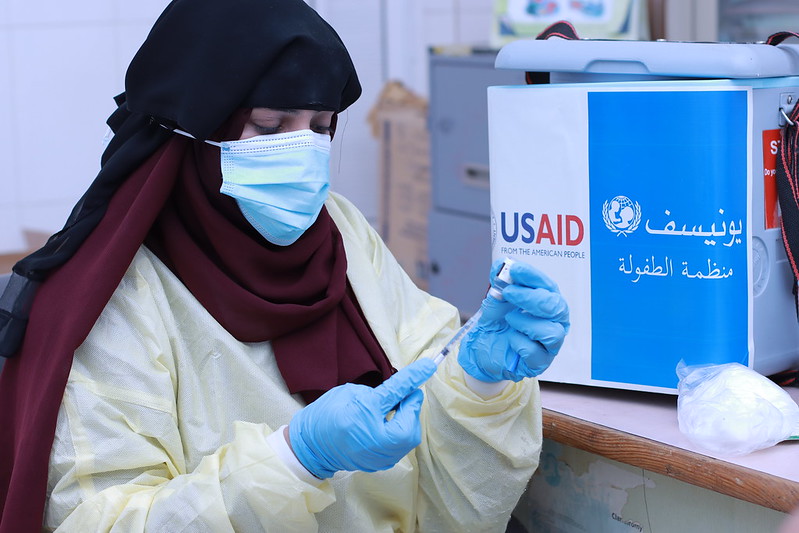USAID Programs Push Yemen toward National Stability
 Yemen has one of the world’s worst humanitarian crises due to prolonged instability after Houthi insurgents took control of Yemen’s capital and largest city in 2014. Now, out of the 35.2 million Yemeni citizens, at least 18.2 million live in severe poverty and rely on foreign aid. The United States government actively provides humanitarian aid to Yemen. In 2024, it announced nearly $220 million in funding to advance Yemen’s transition toward stability. USAID programs in Yemen target key areas that require development and support and are integral to the survival of the Yemeni population.
Yemen has one of the world’s worst humanitarian crises due to prolonged instability after Houthi insurgents took control of Yemen’s capital and largest city in 2014. Now, out of the 35.2 million Yemeni citizens, at least 18.2 million live in severe poverty and rely on foreign aid. The United States government actively provides humanitarian aid to Yemen. In 2024, it announced nearly $220 million in funding to advance Yemen’s transition toward stability. USAID programs in Yemen target key areas that require development and support and are integral to the survival of the Yemeni population.
Food Security
In Yemen, 17.6 million people face high levels of food and nutrition insecurity. USAID funding supports the efforts of the World Food Programme (WFP) and seven NGOs to provide food assistance across Yemen. The funding provides communities with U.S. and locally sourced commodities and cash vouchers for individuals without enough money to shop at local markets, according to a 2024 USAID fact sheet.
In October 2023, USAID contributed $10.1 million for ready-to-use therapeutic food (RUTF) providing for 144,000 cases of treatment to severe and acute malnutrition.
Health
Years of conflict have left more than 30 million people in need of humanitarian assistance, yet 50%, of health facilities in Yemen are non-functioning or only partly functioning due to a lack of funds, medicines, supplies electricity, and equipment. USAID funding provides primary care and nutrition services to Yemen through static and mobile medical facilities. Additional funding equips health facilities with medical supplies and pharmaceuticals, according to a 2024 USAID fact sheet. USAID funding enabled the World Health Organization (WHO) to provide medical oxygen to more than 1 million patients at 25 hospitals in Yemen during 2021 and 2022.
Water Sanitation
Ongoing conflicts in Yemen increasingly destroy the country’s water and hygiene infrastructure. Now, Yemen faces one of the world’s worst water crises with 16 million people in urgent need of water sanitation and hygiene. With the help of USAID, an additional 1.8 million Yemenis have access to clean water and improved sanitation services in 2024. USAID funds the rehabilitation of water systems, improved sanitation services such as repaired sewage networks, and the installation of toilets and handwashing facilities in homes and health facilities.
Education
A lack of reliable school facilities and resources leaves millions of Yemeni children uneducated. USAID funding in Yemen reached 275,000 children across 676 formal and informal educational settings in 2024, according to the Yemen Country Profile. Aid funds teacher training, educational equipment, teaching materials, child protection, water sanitation and hygiene activities. Due to conflicts and natural disasters, USAID funds home learning programs to maintain education in communities battling school closures.
National Economy Support
USAID programs focus on strengthening the Yemeni economy hoping a stable national economy will increase overall stability in Yemen. USAID helped Yemen establish its first foreign exchange auctions, increasing transparency and stabilizing previously volatile exchange rates, while also supporting the implementation of 17 World Trade Organization (WTO) trade facilitation agreements. Additionally, USAID facilitated more than $2 million in export sales agreements. USAID works to strengthen economic institutions such as the Central Bank of Yemen.
Despite the severe humanitarian crisis and ongoing conflicts, the United States remains committed to providing crucial humanitarian support via USAID programs in Yemen. Through multi-faceted programs addressing food security, health, water and sanitation, education, and economic development, this assistance aims to alleviate suffering, build resilience, and support Yemen’s fragile transition towards stability. While challenges persist, this comprehensive approach demonstrates the international community’s dedication to helping Yemen overcome adversity and create a more promising future for its citizens.
– Lauren Thompson
Lauren is based in San Francisco, CA, USA and focuses on Good News and Global Health for The Borgen Project.
Photo: Flickr
